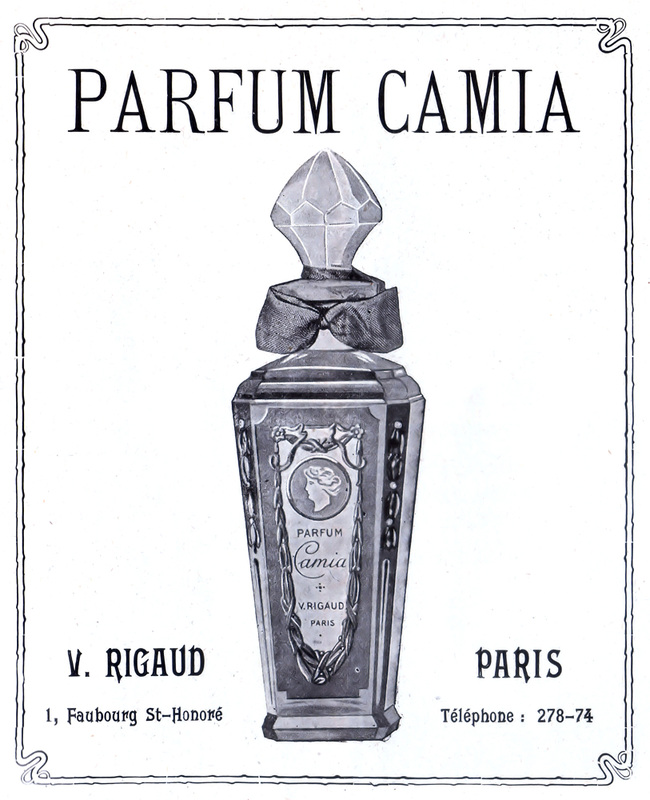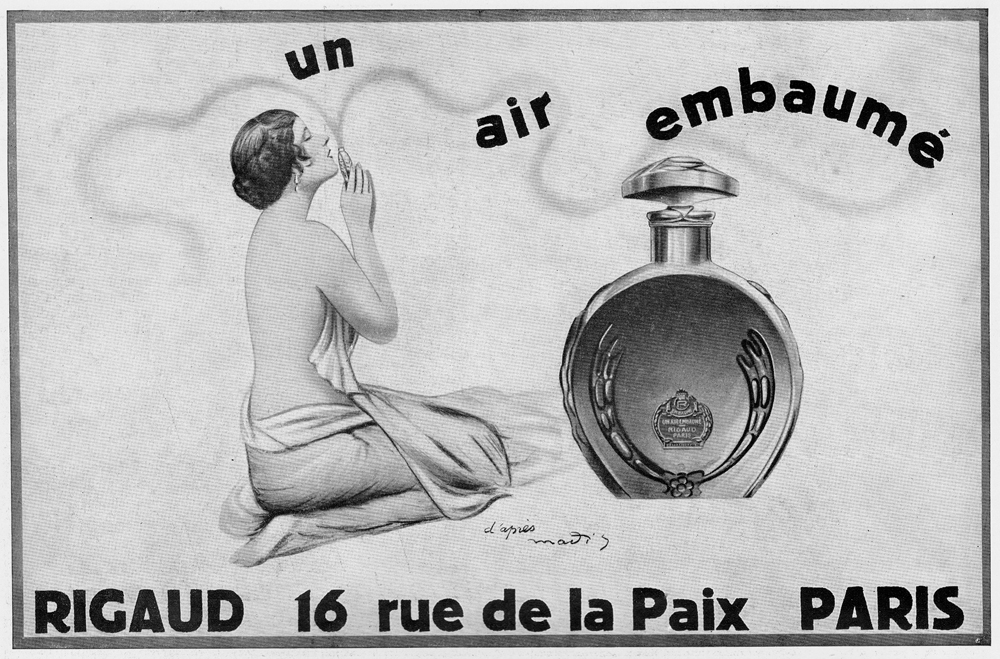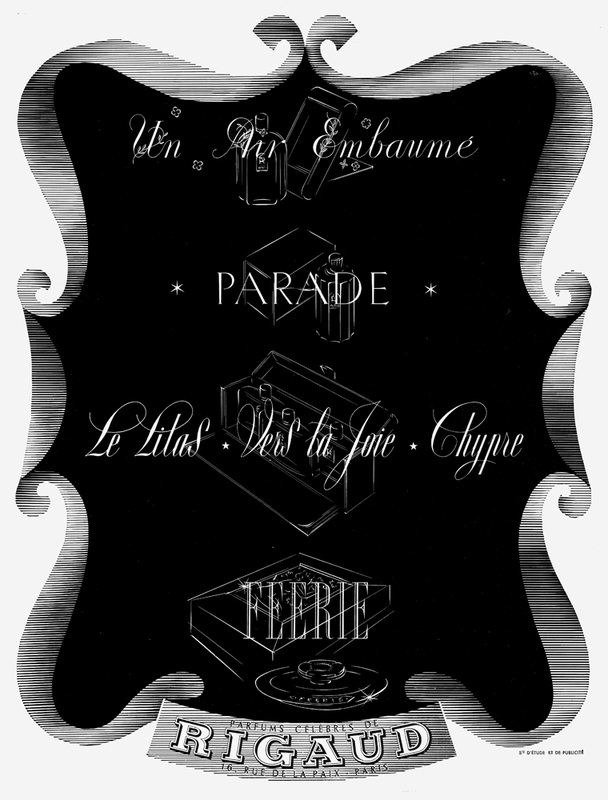In this guide I have listed the various perfumes produced by Rigaud of Paris France & New York City.
c1927 ad
The company was very successful with branches in London, Milan, Madrid, Australia, New Zealand and in both North and South America.
The company participated in several 19th century exhibitions and was awarded gold medals in 1878, 1889, and 1900. Rigaud produced many luxury presentations. They are best known for their all time best selling perfume - Un Air Embaume.
Famous Parisian actresses were among Rigaud's best clients-theatre themed perfume names included: Actrices, Prince Igor, Mary Garden, Marthe Chenal and Geraldine Farrar.
The Pharmaceutical Era, 1924:
"Parfumerie Rigaud. Starting as the hobby of a Parisian pharmacist in the middle of the last century, the Parfumerie Rigaud, has grown into one of the largest perfumery houses France and long has enjoyed a world wide from the most exclusive clientele. Jean Baptiste Rigaud was the founder of this perfumery institution which bears his name. In his laboratory behind the prescription case of his drug store he worked out the formulas for his perfumes and perfected the odors when he was not waiting on customers and directing his clerks. His research work was a labor of love, which combined with his skill as a chemist, resulted in the production of several lines of perfumes that have been famous for generations for their exquisite qualities. Mary Garden perfume and Un Air Embaume, while only two of the big lines, are probably the best known of the Rigaud products. The Narcisse de Rigaud is another odor finding many friends and supporters. Among the new lines now being placed before the trade is Mi Nena (My Darling). This line is complete from the perfume down to powders, lip sticks and rouge. Another new item in the Rigaud factories is the two mirror compact. It has one compartment for powder and another for rouge and is still small enough to fit snugly in the places where compacts are carried. For over half a century, Rigaud has maintained a retail store in Paris where he has catered to those who demand the choice in perfumery. The products have been imported to America for the last 15 years."
Rigaud's exhibit at the 1925 Art Deco expo in Paris
c1927
The perfumes of Rigaud:
- 1845 Eau de Kananga du Japon (original version)
- 1867 Ylang Ylang
- 1867 Manilla Bouquet
- 1868 Jockey Club
- 1868 Ess. Bouquet
- 1868 Maybloom
- 1868 Honeysuckle
- 1868 Jasmine
- 1868 New Mown Hay
- 1868 Patchouly
- 1868 Rondeletia
- 1868 Moss Rose
- 1868 Spring Flowers
- 1868 Bouquet Victoria
- 1868 Heliotrope
- 1868 Honeysuckle
- 1868 Violette (still sold in 1921)
- 1868 Bouquet de Paris
- 1868 Bouquet Miranda
- 1868 Tolutine Toilet Water
- 1875 Eau de Cologne
- 1876 Rose
- 1876 Musk
- 1876 Champacca
- 1876 Alexia
- 1876 Barrana
- 1876 Rose-Wood
- 1876 Sicilian Bouquet
- 1876 Tropical Bouquet
- 1876 Amber Flowers
- 1876 Musk Flower
- 1876 La Plata Flower
- 1876 Venezuela Flower
- 1876 Cape Jessamine
- 1876 Malaguetta
- 1876 Nizzaine
- 1876 Lemoncello
- 1876 San-Paquita
- 1876 Kanaga du Japon
- 1876 Indian Violet
- 1882 Kananga Flowers
- 1885 Melati de Chine
- 1885 Champacca de Lahore
- 1888 Bantam
- 1888 Cefiro-Oriental
- 1892 Ascano
- 1892 Lucrecia
- 1892 Graciosa
- 1892 Iris Blanc
- 1892 Iris Ambre
- 1892 Louis XV
- 1900 Kanaga-Osaka
- 1900 Pagoda Flowers
- 1900 Sultan Bouquet
- 1906 Camia
- 1906 Feminine
- 1908 Des Roses
- 1908 Altesse Extract
- 1909 Minena
- 1910 Mary Garden (still sold in 1921)
- 1910 Rose Ispahan
- 1911 Trentini
- 1912 Geraldine Farrar
- 1913 Lilac
- 1913 Lilas de Rigaud
- 1913 Muses de Bois (still sold in 1921)
- 1914 Oeillet d'Andalousie
- 1914 Le Parfum de Marthe Chenal
- 1914 Prince Igor
- 1914 High Jinks
- 1914 Cupid's Darts
- 1914 Pres de Vous (still sold in 1921)
- 1914 L'Heure Charmante
- 1915 Un Air Embaume
- 1918 Parfum Tendre
- 1921 Le Lilas
- 1922 Riva Amata
- 1923 Golden Narcissus
- 1923 Mon Seul Parfum
- 1923 Pour Mon Smoking
- 1925 Azur Nuit
- 1925 Souviens-Toi
- 1925 Cher Souvenir
- 1925 Soupirs D'Amour
- 1927 Vers La Joie
- 1930 Ambre
- 1931 Igora
- 1932 Eau de Kananga du Japon (relaunch)
- 1932 Parade
- 1938 Feerie
- 1938 Feerie Moderne
- 1938 Outre Mer
- 1938 Typhon
- 1945 Alize
- 1945 Ruse
- 1945 Temeraire
- 1946 Spirale
- 1946 Tumultes
- 1946 Cantate
- 1946 Style
- 1946 Ombrages
- 1947 L'Air de France
- 1948 Fragrant Breeze
- 1955 Eve Reve
- 1957 Violettes de Toulouse
- 1962 Eau de Kananga (reformulated and relaunched)
- 1920? Bunga Sri Maskota
The Bouquet Miranda perfume line included bottles which had photographs of famous Parisian celebrities of the time (1875).
Parade, launched in 1932 is classified as a oriental chypre fragrance for women. It features notes of bergamot, labdanum, oakmoss, musk patchouli, amber, and blue chamomile.
The Eau de Cologne bottles from the 1800s were made up of cut glass decanters and stoppered bottles.
Pres de Vous, launched in 1914, is classified as a floral fragrance for women. It features notes of Damask rose, jasmine, almond blossom, sandalwood, amber.
Rigaud & Co's Eau de Kananga du Japon was advertised as "surpasses the well known Florida Water as a refreshing and economical accessory to the Toilet."
Vers La Joie, launched in 1927. It is classified as a floral chypre fragrance for women. It features bergamot, roses, lily of the valley, jasmine, sandalwood, oakmoss, musk, amber.






































No comments:
Post a Comment
All comments will be subject to approval by a moderator. Comments may fail to be approved if the moderator deems that they:
--contain unsolicited advertisements ("spam")
--are unrelated to the subject matter of the post or of subsequent approved comments
--contain personal attacks or abusive/gratuitously offensive language